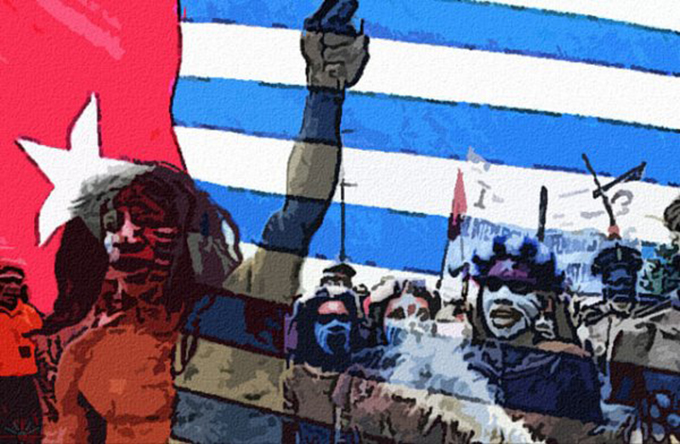Pacific Media Watch Newsdesk
On the eve of New Zealand’s 2017 general election, Pacific Media Watch reports on whether West Papua features in the human rights and foreign affairs policies and stances of the country’s five major parties.
 Since the late 1960s, West Papua has controversially been ruled by Indonesia following what many critics dub an “Act of no choice”. Accusations of human rights abuses are rife and the media are all but banned, despite an apparent lifting of restrictions by President Joko Widodo in 2015.
Since the late 1960s, West Papua has controversially been ruled by Indonesia following what many critics dub an “Act of no choice”. Accusations of human rights abuses are rife and the media are all but banned, despite an apparent lifting of restrictions by President Joko Widodo in 2015.
Pacific Media Watch starts with the party that has the strongest policy on West Papua:
Green Party
The Greens have kept the issue of West Papua’s right to self-determination in the public eye and political arena, particularly Green Party MP Catherine Delahunty, who said she would continue to speak up for the people of West Papua, despite not running for re-election.
West Papua features heavily throughout the Greens website, both in the blog and press release sections. These sections reveal the party’s advocacy appears to stretch back to 2005.
Several Green MPs also signed the Westminster Declaration – a document which calls for West Papua’s right to self-determination to be legally recognised through a vote – during the visit of Free West Papua advocate Benny Wenda in May this year.
However, West Papua does not feature in the party’s human rights policy, but it does feature strongly within its “Global Affairs” policy. The document states it will promote human rights in Asia and support the self-determination movements of non-self governing territories, such as West Papua.
West Papua is mentioned both in relation to the Pacific Islands Forum and the UN Committee on Decolonisation in terms of its status. The policy has not been updated since 2011.
Labour Party
West Papua does not feature on the Labour Party’s website nor does it feature in the party’s foreign affairs or human rights policies.
However, within the party’s “Foreign Affairs Manifesto”, Labour states it will: “Enhance New Zealand’s specialist capability as a peace builder in the Asia-Pacific region” and makes special mention of the country’s past peacekeeping successes in Bougainville, Timor-Leste, Fiji and Solomon Islands.
Labour MPs Louisa Wall, Carmel Sepuloni, Adrian Rurawhe and Aupito S’ua William Sio have also signed the Westminster Declaration.
Māori Party
Like Labour, the Māori Party’s website does not feature any information on West Papua.
West Papua also does not feature within the party’s 2017 policy manifesto, and is absent in relation to international trade and relations and also Pasifika.
However, Māori Party co-leader Marama Fox has signed the Westminster Declaration.
National Party
Similar to both the Labour Party and the Māori Party, West Papua does not feature on National’s website. The issue of West Papua is not included in either its foreign affairs or Pacific Peoples policy.
The National government has also been criticised for its apparent refusal to acknowledge West Papua’s right to independence and instead uphold the sovereign integrity of Indonesia and its territorial jurisdiction of West Papua. This criticism has been directed at former Foreign Affairs minister Murray McCully and current minister Gerry Brownlee, largely by Free West Papua groups and the Greens.
In August this year, New Zealand’s Foreign Affairs, Defence and Trade Committee rejected a petition spearheaded by West Papua Action Auckland which called for the government to make a “public and unequivocal” stand regarding West Papua’s right to self-determination.
A motion tabled in July 2014 by the Green Party calling on Indonesian president Joko Widodo to commit to genuine press freedom was supported by the government, however.
National Party MP Chester Burrows has also signed the Westminster Declaration.
New Zealand First
New Zealand First’s foreign affairs policy does not feature West Papua and no information on the Indonesian ruled region can be found on the party’s website.
When New Zealand First leader Winston Peters was Foreign Affairs minister in 2006, Maire Leadbeater of the Indonesia Human Rights Committee urged Peters to take urgent action over West Papua in a letter.
However, New Zealand First has said, within its 15 principles, that it wishes to be a “reliable neighbour in our region”.
Free West Papua advocacy group West Papua Action Auckland announced in August this year it was approaching all political parties to seek a clear policy statement on West Papuan self-determination prior to the election.
The group said: “New Zealand’s shameful acquiescence in this horror story in our neighbourhood must end.”
- More NZ election stories
















































[…] Source […]
Comments are closed.